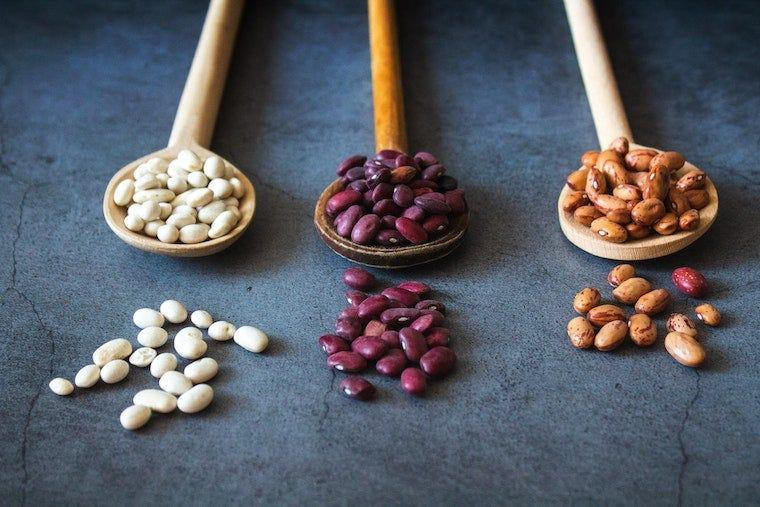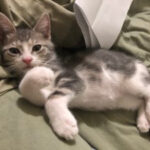It’s National Bean Day, and while you might be celebrating with a hearty bean-based dish, you might wonder if you can share this protein source with your feline friend. Cats are curious creatures, often sniffing around our plates, and beans, in their various forms, might pique their interest. But Can Cats Eat Beans safely? Let’s dive into the world of beans and explore what’s safe, what’s not, and everything in between for your beloved cat.
 three wooden spoons holding white, kidney, and pinto beans – can cats eat beans?
three wooden spoons holding white, kidney, and pinto beans – can cats eat beans?
Are Beans Safe for Cats? The Purrfectly Plain Answer
Yes, cats can eat beans in moderation, but it’s not as straightforward as a simple “yes.” Plain, cooked beans are generally not toxic to cats and can be offered as an occasional treat. However, beans should never be considered a significant part of a cat’s diet. While beans are lauded as a protein powerhouse for humans, they don’t offer the same nutritional benefits for our feline companions.
Why Beans Aren’t a Protein Powerhouse for Cats: Understanding Obligate Carnivores
Cats are obligate carnivores, meaning their bodies are biologically designed to thrive on a diet primarily composed of animal protein. This is not just a preference; it’s a physiological necessity. Unlike humans or even dogs who can efficiently convert plant-based proteins into essential nutrients, cats require specific amino acids like taurine, which are predominantly found in animal tissues.
While beans do contain protein, it’s plant-based protein, which is not the optimal source for cats. Their digestive systems are not as efficient at processing and utilizing plant proteins compared to animal proteins. Relying on beans as a primary protein source can lead to nutritional deficiencies in cats over time. Think of beans as a very occasional snack, not a dietary staple.
The Good, the Bad, and the Bean: Potential Benefits and Risks
So, are beans completely devoid of any benefit for cats? Not necessarily. Plain, cooked beans can offer some fiber, which might be beneficial for cats with mild digestive issues. Fiber can aid in regulating bowel movements and can help with both constipation and diarrhea. However, the amount of fiber in a few beans is minimal and there are more species-appropriate ways to boost a cat’s fiber intake if needed, like certain vegetables recommended by a vet.
The risks associated with feeding cats beans largely revolve around digestive upset and potential toxicity from added ingredients. Beans are not a natural part of a feline diet, and some cats might experience gas, bloating, or diarrhea after consuming them, especially if given in large quantities. Furthermore, many bean preparations for human consumption contain ingredients that are harmful to cats.
Types of Beans: A Cat-Friendly Guide (and Which to Avoid)
When considering offering beans to your cat, it’s crucial to know which types are less problematic and which are definite no-gos.
Chickpeas (Garbanzo Beans)
Chickpeas, also known as garbanzo beans, are generally considered safe for cats in small, plain, cooked portions. However, like other beans, they can be difficult for some cats to digest, leading to gastrointestinal issues. If you offer your cat a chickpea, ensure it’s cooked thoroughly and served plain, without any added seasonings. Hummus, for example, is not suitable for cats due to added garlic, onions, and lemon juice, which can be harmful.
Black Beans
Similar to chickpeas, plain, cooked black beans are not typically toxic to cats. If your cat manages to sneak a plain black bean, it’s unlikely to cause serious harm. Again, moderation is key. Canned black beans should be rinsed thoroughly to remove excess sodium and preservatives before offering a tiny amount to your cat, if at all.
Refried Beans: A Definite No-No
Refried beans, especially those commercially prepared, are generally unsafe for cats. The primary concern is the common inclusion of garlic and onion, both of which are highly toxic to cats. Even small amounts of garlic or onion powder can cause hemolytic anemia, a dangerous condition where red blood cells are destroyed. If you make refried beans from scratch and are absolutely certain they contain no garlic, onion, or other harmful spices, a minuscule, plain portion might be acceptable, but it’s best to avoid refried beans altogether to be safe.
Green Beans: Technically Not Beans, a Veggie Option
Green beans are technically legumes, but often referred to as beans. Cooked or steamed plain green beans can be a safe and even healthy treat for some cats. They are low in calories and can provide some vitamins and fiber. Some cats might actually enjoy the taste and texture of cooked green beans. However, avoid green bean casseroles or any green bean dishes prepared for humans, as they often contain onions, mushrooms, and other ingredients that are not cat-friendly.
 white bowl filled with coffee beans and coffee beans scattered
white bowl filled with coffee beans and coffee beans scattered
Dangerous “Beans”: Cacao Beans and Coffee Beans – Absolutely Keep Away!
Speaking of beans, it’s crucial to differentiate between edible legumes and other “beans” that are highly toxic to cats. Cacao beans (chocolate) and coffee beans, while referred to as beans, are actually seeds and pose significant health risks to felines.
Caffeine and Theobromine Toxicity
Both coffee beans and cacao beans contain methylxanthines, specifically caffeine and theobromine. These compounds are stimulants that are toxic to cats (and dogs). Theobromine is particularly harmful. These substances can cause a range of adverse effects, from mild hyperactivity to severe and life-threatening complications.
Symptoms of Poisoning
If your cat ingests coffee beans or cacao beans, watch out for these signs of caffeine or theobromine poisoning:
- Vomiting
- Diarrhea
- Restlessness and hyperactivity
- Increased heart rate
- Rapid breathing
- Muscle tremors or twitching
- Seizures
- Elevated body temperature
In severe cases, poisoning can lead to cardiac arrest, coma, and even death.
What to Do if Your Cat Eats Cacao or Coffee Beans
If you suspect your cat has consumed cacao or coffee beans, it’s crucial to seek immediate veterinary attention. Do not attempt to induce vomiting at home, as it can be dangerous for cats. A veterinarian can provide the necessary treatment, which might include inducing vomiting safely, administering activated charcoal to absorb toxins, and providing supportive care.
The Final Verdict: Beans for Cats – Moderation and Caution are Key
So, circling back to the original question: can cats eat beans? Yes, plain, cooked beans are not inherently toxic and can be given in very small amounts as an occasional treat. However, beans offer minimal nutritional benefits for cats and can cause digestive upset. It’s essential to avoid beans prepared with seasonings, especially garlic and onions, and to strictly keep cacao and coffee beans far away from your feline companion.
Ultimately, while a few plain beans won’t likely harm your cat, they are not a necessary or ideal part of their diet. Focus on providing your cat with a balanced diet formulated for obligate carnivores, rich in animal protein. If you have any concerns about your cat’s diet or if they have any underlying health conditions, always consult with your veterinarian before introducing new foods, including beans.


